Ptarmigan operated in Tallinn from 2011-2014. We no longer maintain any presence in Tallinn, but this website will continue to serve as an archive of the activities produced at Ptarmigan during these years.
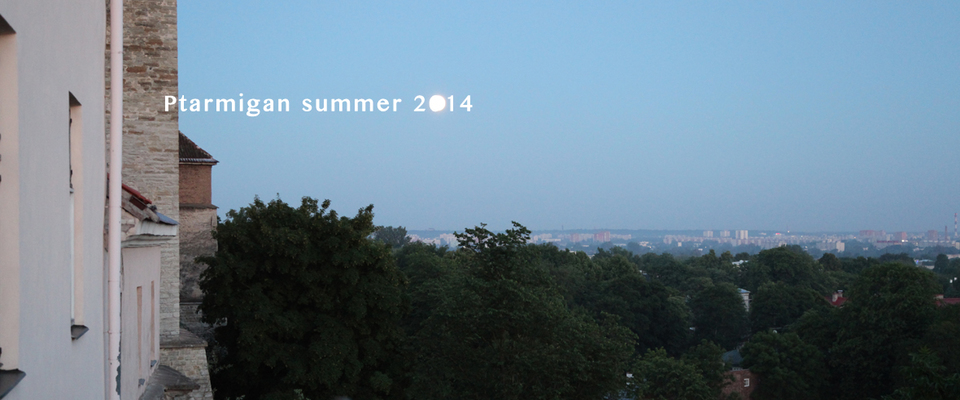
Ptarmigan project space (Tallinn, Estonia) is looking for creative minds!
We're looking for people who can contribute to Ptarmigan's activities from April - September 2014. Ptarmigan is generally focused on creating participatory activities that are open and inclusive. We are probably not a good fit for those looking to create their own visual art or performance events.
Proposals are welcome that focus on one (or more) of the following "streams":
This is a residency, and it is also not a residency. We are an unfunded, volunteer-run organisation that will close (or change drastically) in autumn 2014. This is most likely our final summer, and we want to do good things with good people. We can't offer any financial support; we're trying to find a way to pay the bills ourselves! However, we can write invitation letters for your local funding agencies, if that will help.
What we can definitely offer is enthusiasm, the physical resources of the place (rooms, equipment, furniture), and the network of interesting people in our axis. What we really want are flexible people with good ideas who want to come and spend a bit of time with us and make great things happen. Maybe you have to be a bit crazy, but that's who we typically get along with anyway. Ptarmigan has always been as much of a "lifestyle" as an artistic platform, and that's not going to change. Think of this as a bizarre summer camp
Everything is negotiable. And as we've said in the past, everything is tentative.
Send us your ideas by emailing the name of the city we're based in, "@" the domain name of this website. As this open call is as flexible as the actual 'residencies' will be, there's no deadline or anything like that; just be practical.
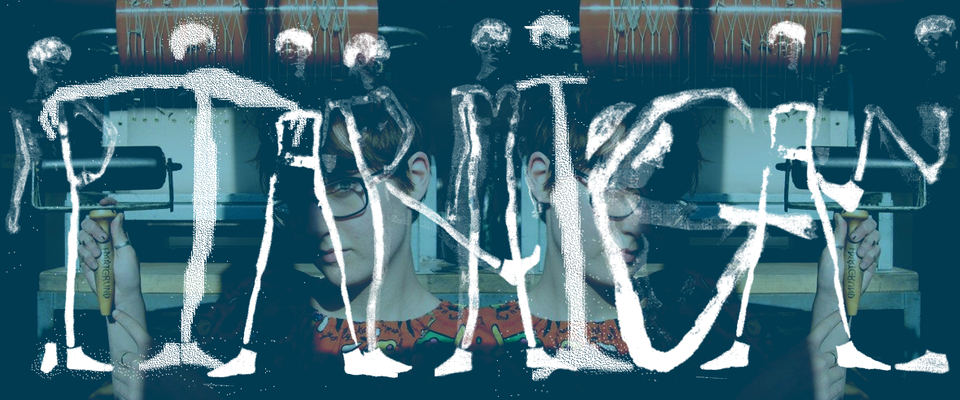
We're pleased to have our good friend Hannah Harkes officially join the team, where she will be Director of Creative Hemispheres the IInd. Hannah will be reponsible for all Ptarmigan activities during the gap between the end of Andrew Paterson's residency and the start of our yet-unscheduled Summer 2014 madness.
Hannah Harkes is a Scottish artist currently based in Tallinn, Her work sits in the interstice of slapstick and sincerity; where play meets morbidity and temptation meets repulsion. The drawn mark informs her practice, as does language and forcibly changed context. On the question of the viewer's position, she is becoming increasingly interested in who the player is.
And the standard bio: After graduating from Gray's School of Art in 2011 with a BA(Hons) in Fine Art Printmaking, Hannah became resident at Polymer Culture Factory in Tallinn, where she mainly made video works from the depths of an existential crisis. She returned to Scotland to do a drawing/durational action exhibition at the Royal Scottish Academy in Edinburgh then moved to Finland where she worked for some time at the Nelimarkka Museum in the middle of nowhere, resuscitating the dusty stone lithography facilities and making comics. She was invited as resident artist to the Novia Fine Art school in Jakobstad, Finland, where she formed an art school band and released one cross-genre album before disbanding and returning to Estonia, to co-run Grafodroom printmaking workshop and artists' studios in Tallinn's old town. From this spot she is now working on video games, audio games, comic books, upcycled contraceptives and sometimes prints.
At Ptarmigan, Hannah plans, in collaboration with others, a handful of events that are connected perhaps only by the desire to encourage people to do things together and also to do things with things that don't do the things that those things usually do.
We've worked closely with Hannah for over two years, through various events in both cities and at Tiib, and love her incredibly. With her energy we will hopefully survive the darkest and coldest part of this winter.
At Ptarmigan, 2014 began with the Fictiocratic Operations no. 27C experiment, a bizarre evening that we're still trying to unravel. Artefacts and other evidence will soon reach this digital realm.
We are pleased to host Andrew Gryf Paterson in January as part of the Axis of Praxis residency programme. Andrew will be based in Ptarmigan for the month before heading to MoKS; the project, supported by Kulturkontakt Nord, seeks creative practitioners to engage with the two distinct communities of Ptarmigan and MoKS and hopefully find a bridge that extends beyond the easy dichotomy of "urban/rural" . We've worked closely with Andrew over the years, all the way back to the beginning, so we're happy to have him here.
His main objective for the residency periods is to focus time outside of usual work patterns towards writing the introductory and contextual sections of his article-based doctoral candidate manuscript, which reflects on artistic fieldwork from an auto-ethnographic/archaeological perspective, acknowledging the different contexts, influences and outgoings of Finnish & Latvian -based processes (for example Herbologies/Foraging Networks 2010-2011, Happihuone 2005-2007 & Clip Kino 2008-2010, plus earlier Locative media projects 2003-2005). In addition to text he will identify documentation, media, meta-data, and other 'figure' -like artefacts from the fieldwork. During the residency period in Tallinn & Mooste, he will guest-host two invited dinner events to present and share stories about the artefacts related to each period of fieldwork mentioned above. The invited diners would also be encouraged to also share stories and artefacts which remain from hosting experiences (related to art projects, food or other social events).
Our friend Mari-Anna Lepasson will host an Art and Anthropology Workshop here on Saturday, 18 January. This workshop will be based heavily in diary writing and participants will study their own behaviour and their influence of themselves on other participants and vice-versa. There's no registration required so please just turn up.
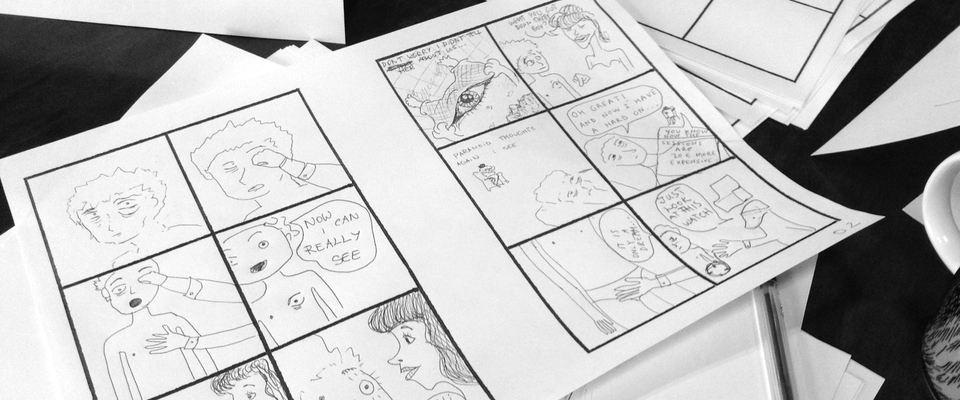
September's Collective Comics Workshop led by Javier Lozano Jaén (Spain) resulted with 142 pages long comic book. Mari-Anna Lepasson wrote her reflection upon that event from the participant's point of view. The text is a part of the book itself but it can also be read below.
Day 1: The Death of the Author
COFFEE
The weather was shitty and cold. Through the doors and corridors, there were a few of us sitting in the kitchen. We were making and drinking coffee of course. It was an important part of the process, both coffee and cigarettes (not that all of us were coffee and cigarettes kind of people). We had to start somewhere. We barely introduced ourselves at first. It was unclear who knew who’s name.
PEN
We sat in a circle in the chilly ptarmigan workshop room. The tables, pens and papers circulated among us, as it became clear that we would be sharing a black and white view of things. Some of us took the black pens home because who doesn’t like free stuff (or maybe subconsciously, to be able to continue whatever that thing was that we were doing or feeling there; to be able to continue the lines).
PORTRAIT
Javier put on a three minute song and the challenge was set: look to your right and make a portrait. The memory of the lines on the face of the other person melted together with a memory of becoming a line on someone else’s paper. Although the events of modelling and drawing were separated in time, they existed simultaneously as the material product of the three-minute portraits. The next drawing was made with the left hand. It was liberated from the previous stiffness of “rehearsed lines”. Of course, some don’t have right as the primary working hand and for them the change was in the opposite direction.
COLLECTIVE STORYTELLING
The main exercise of drawing the comics was done in a process of sharing stories. We each had to fill in one panel, part of a six-panel grid. Javier put on two-minute songs and the papers went around in the circle of people, allowing for fast reactions to quick drawings and texts. There was no time to make shadows. Rapidly our collective hand adjusted to making simple and precise panels. One would think of a storyline or what the next few panels might bring, but once the paper was out of one’s hands, it was left at the mercy of fast connections made by the collective storytellers. We all had our ways of reading and producing the story, finding patterns and potentials, relating to characters. This way, a character or a joke was created through multiple perspectives and ways of drawing, belonging at once to all of us and to none of us individually.
WORDLESS COMMUNICATION
We had fun sending each other little messages by dialogue and pictures, messages with all of us as the addressee. We all responded to these messages, used the props and made-up characters at hand to produce comics that were a bit twisted and strange, bold and funny. The lack of direct responsibility allowed for a freer playground in our storylines. As with the left hand, we could break out of learned templates.
TIME
Time wasn’t exactly passing. It consisted of comic-panels. And when a story made the full circle back to someone, it took this person to a space and time of this story. And memory of drawing and experiencing the certain comic became obscured and complemented by the new moment where the person saw the same story having evolved. The changing music affected moods emerging in the comics. The music, which exists only in relation to time, was also defining time for us. It was an experience of time cut in pieces and rearranged.
ARGUMENT
Some of us had expectations of what this workshop would bring. In the beginning, Javier discarded the idea that he would teach us anything. Also, he was not to be the one to decide on the rules, as he didn’t want that responsibility. So it was that we had a peaceful argument over which way to go with the next exercise. There seemed to be two sides and those floating in between. One wanted to do an exercise based on different kinds of comic texts and the other wished to keep the importance of images, voting for a more surreal approach. Like in any human consciousness, our collective mind had to choose between somewhat conflicting opinions, making a decision by acting. Both choices meant some sacrifice had to be made. We went with the one that threatened to make the stories completely nonsensical. Because more of us wanted to keep on drawing images and not concentrate on text. Democracy!
FREEDOM
The task ahead was even more challenging. One could choose any of the twelve windows on the A4 to write one text and one picture. The next person had to do the same, adding text to someone’s picture or vice versa. This called for more concentration and speed of thought as the timeframe was left the same. It was almost a paralysing freedom as sometimes one would think too long of what to do and start scribbling only as the music stops. There were obvious delays in the movement of papers. How do you find patterns in a story that lacks a beginning, an ending and a middle point? When we read them in the end, we laughed.
Day 2: Taming the lines
WEATHER
The weather was better but it was still so cold, as if the cold of the day before had caught up with us. In the workshop room there were radiators under big windows where one could sit and snuggle up to feel warmth. The morning was slow and sleepy but having a new person turn up brought an interesting sense of energy, like a gust of wind through a dusty room. So that all the dust in our heads could start dancing around, creating new lines on the paper.
TREASURE HUNT
We had a plan. We knew that we had to finish the comics that had not ended on their own. But still we carried on with some stories to pass on the responsibility of making them meaningful. Passing on and moving forward, we quickly reached the long lunch break.
In between comics a strange event occurred. Near ptarmigan space, there is a narrow path that takes you to the other side of the Old Town walls and down to the Baltic Station. First, there was a red apple standing in the middle of the dirt road. It was almost as if someone had placed it there intentionally to draw attention to what lies ahead. The crumpled up jacket seemed normal enough for the side of the road. But the wallet with cards pulled out, keys separated from the chain, and the twisted unopened beer can caught our eye. So instead of going for food we collected and carried the items back to ptarmigan, trying to imagine their owner and the state he might be in.
TAMING THE COLLECTIVE MIND
The break was long and we found places to sit around, some of us drawing, some just getting warm and telling jokes. Soon came the moment to face all the comics. We divided five groups of drawings between five people and each one had to find the right order, put headlines and make a cover for one pamphlet. Standing face to face with the product of collective drawing was overwhelming (at least for some of us). It seemed that we were more a part of the stories than the stories were a part of us, the opposite of what you might expect from an individual work of art. There was little logic between the stories but still one tried to find something to connect them, to tone down the rawness.
Some of us were working fast as before, some of us not so productively. It was a mix of individual work and helping each other tame the collective lines. Which I doubt we ever could achieve, they have their own lives now, out of our hands and logic.
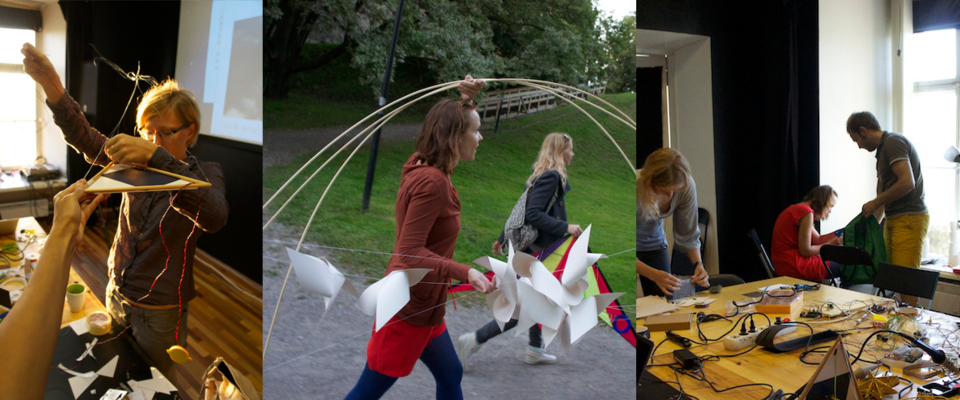
Juan's Aeolian artifacts workshop was a fun few days of experimentation with electronics, kites, and other ways wind might be used to generate sound. Though the intervention aspect didn't work out (due to Tallinn's weather patterns delivering the first wind-free day in weeks, exactly the one time we needed it), an enthusiastic group of participants worked together in an environment that allowed them to try various fun + beautiful techniques.
The workshop concluded Juan's residency at Ptarmigan (which was supported by the KK Nord Nordic-Baltic mobility programme) and we enjoyed his presence immensely.
Juan has some video and further writing on his website, and is planning to return to Tallinn and lead a followup workshop this autumn (which will be open to everyone).
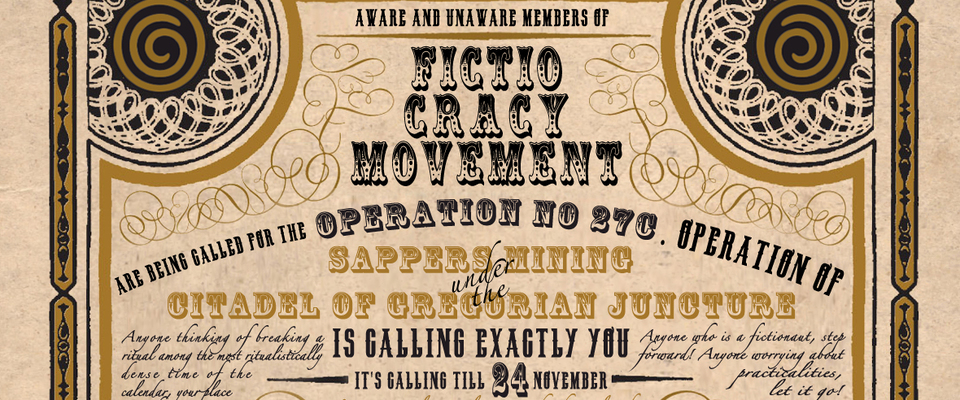
Aware and unaware members of the Fictiocracy movement (1) are being called for Operation no. 27C (2)! Operation of Sappers Mining Under the Citadel of Gregorian Juncture is calling exactly you! It's calling till 24 November (3)! If you miss this opportunity, there will never be another!
Anyone thinking of breaking a ritual among the most ritualistically dense time of the calendar (4), your place is with us! Anyone who is a fictionaut (5), step forward! Anyone worrying about practicalities, let it go (6)!
We are meta-reality social movement that has a place for everyone, with everyone in his/her place! If you decide to join us, we congratulate you here and now and invite to manipulate the environment, and the people within it, under the spell of the Holiday Spirit (4)!
But hurry, be sure not to miss the 45th anniversary of Apollo 8's return to Earth. We start on 27 December 2013, at 10:51 a.m. EST (7) in Tallinn, Estonia, never to reopen again! Accursed be anyone who doesn't believe us!
-------
(1) Fictiocracy is a meta-reality social movement -- a subversive, persistent and systematic declaration of rights for life according to fiction.
The prevalent paradigm of reality, based on the collaboration of shared "meaning" with sensual "concreteness", is like a fortress, built to shield us from the full wilderness of our lives.
Yet the walls of this fortress are as fictive as any. Ultimately, we govern ourselves by our creations: Things such as societal forms, or the laws that actualize them, are creations comparable to novels or movies -- hence, they can be observed as fictional works. The fortress has always been infiltrated, made from the very matter it seeks to resist.
Fictiocracy incorporates our fabrication, and the processes that go along with it, into our reality, without branding them as second-class citizens and inconsequential participants. It acknowledges the presence of the fictitious and articificial in the very soil of our lives. We depend on fiction -- this is not something that should be minimized, with an apologetic air, but exploited in a celebratory manner. We can create the reasons for our existence. Our beliefs, our manner of being can stand proudly on fabricated roots.
Our reality is already a work of creation, a texture of our fabrication. It's time that we started to live like it.
(2) Another embodiment of Migrating Art Academies, hosted by Ptarmigan between 27 Dec 2013 - 2 Jan 2014 in Tallinn, Estonia.
(3) More info and the registration form.
(4) The surrounds of the New Year's Eve: A time of subservience to our common practices, their constraints offering a fenced form of freedom. Revelry by rules, party by the numbers. What can be created with such material? How does it react? How can we modify its behavior?
(5) Anyone interested in co-operation between arts and all other fields (not limited to activism, anthropology, game design, performance, etc.) which serve the creation of innovative architectures of social convention and utopian fantasy productions. Anyone willing to blur the borders between art, social rituals and life itself by any accessible means, whether altering the norms of New Year's Eve or re-designing the organisations which host them.
(6) Travel costs are covered, accommodation and food are provided.
(7) 27 December 2013, 5:51 p.m. local time.